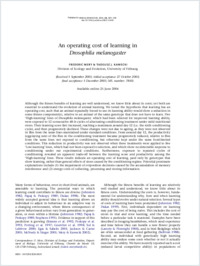An operating cost of learning in Drosophila melanogaster
- Mery, Frederic Ecology and Evolution, Department of Biology, University of Fribourg, Switzerland
- Kawecki, Tadeusz J. Ecology and Evolution, Department of Biology, University of Fribourg, Switzerland
-
25.06.2004
Published in:
- Animal Behaviour. - 2004, vol. 68, no. 3, p. 589-598
English
Although the fitness benefits of learning are well understood, we know little about its costs; yet both are essential to understand the evolution of animal learning. We tested the hypothesis that learning has an operating cost, such that an animal repeatedly forced to use its learning ability would show a reduction in some fitness component(s), relative to an animal of the same genotype that does not have to learn. Five ‘High-learning’ lines of Drosophila melanogaster, which had been selected for improved learning ability, were exposed to 12 consecutive 48-h cycles of alternating conditioning treatment under mild nutritional stress. Their learning score first increased, reaching a maximum around day 12 (i.e. the sixth conditioning cycle), and then progressively declined. These changes were not due to ageing, as they were not observed in flies from the same lines maintained under standard conditions. From around day 12, the productivity (egg-laying rate) of the flies in the conditioning treatment became progressively reduced, relative to flies from the same lines not exposed to conditioning, but otherwise kept under the same food-limited conditions. This reduction in productivity was not observed when these treatments were applied to five ‘Low-learning’ lines, which had not been exposed to selection, and which show no detectable response to conditioning under our experimental conditions. Furthermore, exposure to repeated cycles of conditioning revealed an apparent trade-off between the learning score and productivity among the ‘High-learning’ lines. These results indicate an operating cost of learning, paid only by genotypes that show learning, rather than general effects of stress caused by the conditioning regime. Potential proximate explanations include (1) the impairment of oviposition decisions caused by the accumulation of memory interference and (2) energy costs of collecting, processing and storing information.
- Faculty
- Faculté des sciences et de médecine
- Department
- Département de Biologie
- Language
-
- English
- Classification
- Biological sciences
- License
- License undefined
- Identifiers
-
- RERO DOC 4149
- DOI 10.1016/j.anbehav.2003.12.005
- Persistent URL
- https://folia.unifr.ch/unifr/documents/299634
Statistics
Document views: 189
File downloads:
- 1_kawecki_ocl.pdf: 1256
